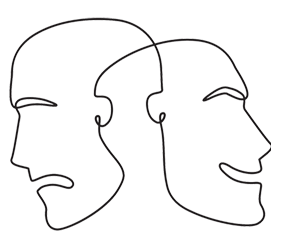Groups for Narcisstic Abuse
Narcisstic Abuse Support Groups
Narcissists fear looking in the mirror because they believe the reality would be awful.

Groups for Narcisstic Abuse
Narcisstic Abuse Support Groups
Poor Narcissus. The gods condemned him to a life devoid of human affection. He fell in love with his reflection in a pool of water and starved to death awaiting its reaction. The term narcissism was named after him. Similar to Narcissus, narcissists only adore themselves in the reflection of others' eyes. It is a widespread misunderstanding that they love themselves. They detest themselves tremendously. Their excessive self-praise, perfectionism, and arrogance are merely masks for their self-loathing, which they rarely admit to themselves. Instead, it is manifested in their contempt for and criticism of others.
Narcissists fear looking in the mirror because they believe the reality would be awful. Actually, they have very little sense of themselves. They are emotionally dead within, and they yearn to be filled and recognized by others. Unfortunately, they cannot appreciate the affection they do receive and alienate those who provide it.
The "NPD" diagnosis of narcissism.
All personality qualities range from mild to extreme, including narcissism. On a continuum, narcissism ranges from mature to archaic. Only neurotic defenses are needed for mature people to achieve their goals, express their gifts, and fall in love; an intermediate group uses borderline defenses and has fragile boundaries; and those who are particularly sensitive to wounding use destructive psychotic defenses and have unstable relationships (Solomon, 1989).
The American Psychiatric Association classified Narcissistic Personality Disorder (NPD) as a disorder in 1987, and it affects 1 to 6.2 percent of the population; males outnumber females by a factor of three (Dhawan, 2010; McClean, 2007). Although nonprofessionals frequently label people with NPD who exhibit a few narcissistic traits, clinical NPD varies in severity from those who exhibit only the minimum required five diagnostic traits to narcissists who exhibit all nine symptoms. Here is a summary of the DSM-5 Diagnostic Criteria:
- Grandiosity (sometimes only in their heads), needing the approval of others, and lack of concern for others.
- Has an inflated sense of self-importance and exaggerates accomplishments and abilities.
- fantasies of limitless power, success, brilliance, beauty, or perfect love
- believes that he or she is exceptional and unique, and that he or she can only be understood by or should associate with other exceptional or high-status individuals or institutions.
- Requires excessive admiration
- has unreasonable expectations of special treatment or compliance with one's wishes.
- Utilizes and take full advantage of others for personal gain.
- insensitivity to the emotions and needs of others
- Is envious of others or believes that others are envious of him or her.
- Exhibits egotistical behaviors or attitudes.
In addition to the grandiose "Exhibitionist Narcissist" mentioned above, James Masterson describes a "Covert" or "Closet Narcissist" — a person with a deflated, insufficient self-perception, a sense of melancholy, and an inner void. Because he or she is emotionally invested in the idealized other, which is indirectly rewarding, he or she may appear timid, modest, or nervous (Masterson, 2004). Malignant narcissists are the most harmful and antagonistic, engaging in antisocial behavior. When they feel threatened or are denied their desires, they can be nasty and spiteful.
Motive for Narcissism
Narcissists are difficult to relate with, yet they did not choose to be that way. Their normal growth was halted as a result of poor early parenting, typically by a mother who did not provide proper caring and idealization opportunities. Some ascribe it to a too close relationship with an indulgent mother, while others relate it to parental harshness or criticism. This latter position derives from Otto Kernberg's emphasis on parental rage, envy, hatred, or indifference that conceals aggressiveness. (Ellis, 2009; Russell, 1985)
The two perspectives converge on the basic psychodynamics. A mother who idealizes and indulges her child may be unable to perceive her child as a distinct individual and give adequate empathy, mirroring, and idealization opportunities. Although leniency can result in healthy narcissism, when psychological control is applied, such as guilt induction and loss of affection, the child's attention is on gaining external acceptance rather than developing a firm sense of self. Instead of receiving support for a developing sense of autonomy, the youngster learns that parental love and participation are contingent on meeting their demands and expectations. (Horton, Bleau, & Drwecki, 2006)
This is what Heinz Kohut saw in his narcissistic clients who suffered from extreme alienation, emptiness, impotence, and meaninglessness. Behind a narcissistic exterior, they lacked the internal structures necessary to sustain cohesion, stability, and a positive self-image in order to provide a solid identity. (Russell, 1985) He believed the failure of empathy between the caregiver and kid was to blame.
Otto Kernberg believed that the sickness began in the oral phase. Yet, he stated that it could even begin during the latency period. Narcissists are unaware of where they end and others begin, and they oscillate between positive and negative feelings about themselves. The two elements of the self that shame divides are the superior and grandiose self and the inferior and insignificant self. When the devalued self is in a position of inferiority, shame manifests via the idealization of others. While defending against shame from a position of superiority, the grandiose self aligns with the inner critic and devalues others through projection. Both depreciation and idealization are proportional to the intensity of shame and the accompanying despair (Lancer, 2014).
Although most people move between these attitudes, exhibitionists and closet narcissists are pathologically fixed in their respective superior and inferior postures regardless of reality. Shame's defenses are haughtiness, denial, projection, envy, and fury (Lancer, 2014).
Despite the need for additional research on narcissism, twin studies have showed a 64 percent link between narcissistic characteristics, suggesting a genetic component (Livesley, Jang, Jackson, & Vernon, 1993).
Partnerships with narcissists are toxic.
It is simple to fall for narcissists. Their brilliance, success, beauty, charisma, and charm, together with compliments, enthralling discussion, and even an apparent interest in others, weave a spell. People are attracted to them and proud to bask in their radiance due to their vitality. Read about parents who are narcissistic.
The Nepotist
At home, narcissists are polar opposites of their public selves. They may disparage the person they just entertained in private. In order to control their internal environment and shield themselves from their high sensitivity to humiliation and shame, they anticipate praise for their uniqueness and distinctive responses in the form of requests and criticism after an initial romance. Their relationships are centered on them, and they view their partners as extensions of themselves. Knowing narcissism, how narcissists' brains are wired, and what motivates their conduct can help you detach, not react, and more effectively cope with them.
Numerous narcissists strive for perfection. Nothing that others do is right or valued. These spouses are discarded if they fail to fulfill their insatiable need for adoration, service, affection, or purchases. The fact that their spouse is ill or in agony is irrelevant. See "How to Determine If a Narcissist Loves You."
Narcissists dislike hearing "No" and frequently expect others to intuitively understand their wants. They manipulate to achieve their goals and punish or make their spouses feel bad for rejecting them. Attempting to appease a narcissist is futile, comparable to attempting to fill a bottomless hole.
They can make their spouses experience what it was like to have a narcissistic parent who was cold, intrusive, or inaccessible. The mother of Anne Rice's vampire Lestat was so emotionally void, yet she devotedly linked with him to ensure his survival. Lack of genuine nurturing and lack of boundaries make narcissists dependent on others to satisfy their unquenchable desire for approval.
The Narcissist's Companion
Although if their partners feel loved when the narcissist says and does wonderful things, is extremely possessive, or buys them expensive presents, their partners distrust the narcissist's sincerity and wonder whether it's all a deception, a show, or a "pretend" personality. They are tense and exhausted as a result of unpredictable tantrums, attacks, false accusations, criticism, and unreasonable rage over minor or imagined slights. These remarks have the potential to escalate into narcissistic abuse.
These partners lack limits and accept as fact everything is said about them. Fearing to displease the narcissist, they compromise their wants and walk on eggshells in futile attempts to gain favor and maintain relationships. They everyday risk being blamed and punished, having their affection withheld, or having the partnership end. As preoccupied with the narcissist as they are with themselves, they worry about what their spouses will think or do. Couples must adapt to the narcissist's frigid environment and become accustomed to emotional abandonment.
They soon develop self-doubt and lose confidence and self-worth. Their communication of displeasure is distorted and answered with defensive blame or more put-downs. The narcissist can throw out criticism but cannot accept it. Yet, they remain because the initial charm, excitement, and loving gestures reappear frequently, especially when the narcissist senses that a divorce is impending. When two narcissists join together, they argue over whose needs are more important, blame each other, and drive each other away, but are miserable because they need each other.
Codependency
Although appearing to have a robust personality, narcissists lack a solid sense of self. To maintain and legitimize their weak, shattered self, their self-image, thoughts, and conduct are focused toward others. Narcissism and codependency share the primary characteristics of denial, control, guilt, unconscious dependence, and dysfunctional communication and boundaries, all of which result in intimate issues. A study revealed a link between narcissism and codependency (Irwin, 1995). Although they are more aggressive than passive, they are codependent in my opinion.
Codependents and narcissists can coexist, despite the fact that it might be painful. This is due to the fact that the narcissist's traits and aura of success improve the codependent's poor self-esteem, making it easier for the accommodater to endure emotional abuse. Normally, accommodators are not authoritative and prefer a subservient position because their own power and wrath are repressed, frightened, and bound by shame. They crave missing aspects of themselves and idealize the attributes of potential partners, which they aspire to absorb. This is the reason why two accommodators rarely meet. They are in awe of narcissists' self-direction and "strong" and live vicariously through their success, power, protection, and charisma, oblivious to their frail personalities and concealed shame (Lancer, 2014).
Accommodators become connected to narcissists who appear confident and discuss their desires and fury, but when they stand up for themselves, they experience feelings of futility and guilt.
Codependents experience a sense of worth as a result of their ability to provide and to please. Because they feel unworthy of love, they do not anticipate being loved for who they are–only for what they offer or do (Lancer, 2014). To sustain their pride and fill their emptiness, narcissists are also drawn to its opposite: emotionally expressive and loving partners, qualities they lack. They require partners they can control and who will not provoke them or make them feel weak (Lancer, 2014).
When more than sex is anticipated, narcissists are frequently the ones who create distance. Intimacy necessitates the surrender of power and control. The concept of dependence is repugnant. It not only restricts their options and makes them feel weak, but it also exposes them to rejection and emotions of shame, which they attempt to suppress. (Lancer, 2014) Their nervous partners pursue them, subconsciously reliving past instances of emotional abandonment. They both feel unlovable beneath.
Let's Talk
You will receive a 15 minute phone call from our group leader, as an introduction to the program and to discuss suitability. This is free and without obligation.


















